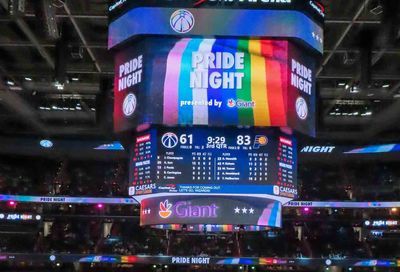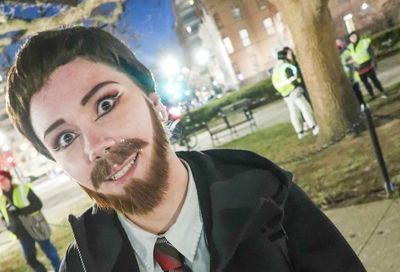Parental Guidance
United Church of Christ affirms the rights of LGBT parents, encourages members to push issue with legislators
The United Church of Christ (UCC), the denomination to which President Barack Obama belonged for two decades, resoundingly approved two resolutions on July 5 in support of civil rights for LGBT people, including the first-ever resolution by a major Christian denomination affirming the right of LGBT parents to adopt and raise children.

Rev. Michael Schuenemeyer
Some say the UCC’s actions could have a significant impact in widening support for LGBT equality in other denominations and among legislators.
The parenting measure passed in a rare unanimous vote by representative delegates to the UCC’s biannual General Synod, said Rev. Michael Schuenemeyer, UCC Executive for Health and Wholeness Advocacy, making it ”about as strong a statement as you can get from a church body.”
The resolution says care of children is ”a moral responsibility for families, the church and the community.” It calls on the church ”to defend the rights of all children to have loving parents without regard to sexual orientation or gender expression, and to recognize a family to be any loving, nurturing, ethical relationship between a child and one or more parents.”
In addition, it calls on all states ”to evaluate prospective adoptive parents solely on the basis of their individual character and ability to parent, not on their sexual orientation or gender identity, and to grant second-parent or joint adoptions when it is in the child’s best interests.”
More than 460,000 children in the United States live in group or foster homes, nearly one quarter of them wait five years or more before being adopted, and nearly 20,000 turn 18 each year without ever having had an adoptive home, the resolution notes.
The resolution also observes that many states do not permit same-sex couples to adopt, either as a couple or as individuals, even though 65,500 adopted children are already living in LGBT households nationwide, and several major medical associations support the right of LGBT couples to adopt.
The resolution requests the church’s Justice and Witness Ministries ”communicate this resolution to local, state and national legislators.”
Local UCC congregations are largely autonomous and are not required to follow resolutions of the General Synod. But Schuenemeyer said, ”That doesn’t mean it’s not paid attention to” and ”doesn’t mean there isn’t a strong consensus in the life of the church that supports the right of LGBT people to adopt,” as evidenced by the unanimous approval of the measure. He said he expects church leaders will speak out as needed at the state and federal levels about LGBT parenting rights as they have done for marriage equality in Maine, Maryland, Vermont, and elsewhere.
A second resolution passed the same day also calls for the UCC to advocate at all levels of government for the application of human rights principles to prevent ”international instances of systematic discrimination, violence and abuse targeting persons based on their sexual orientation or gender identity.” That resolution passed with a 98 percent favorable vote.
While other denominations, such as the Episcopal Church, have issued statements similar to the human rights resolution, no other mainstream Christian denomination has approved a resolution similar to that of the UCC on adoption and parenting by LGBT people. In 1993, however, the Union for Reform Judaism (then called the Union of American Hebrew Congregations) approved a more limited resolution stating that ”individual lesbian or gay parents have been adjudged unfit to raise their own children because they are lesbian or gay” and calling on all levels of government to enact legislation to stop such judicial bias.
Sharon Groves, director of the Religion and Faith Program of the Human Rights Campaign, said it is ”absolutely huge” for legislators who are LGBT allies to have religious backing like the UCC’s resolutions. Legislators are ”regularly bombarded by the religious right,” who have ”used religion consistently as a way to oppose us. It’s really critical for our legislators to both feel the support and understand that no one owns religion.”
For anti-LGBT legislators, she added, religious support of LGBT equality is ”a wake-up call that they can’t just assume that the religious community is a monolith against LGBT issues.”
”The UCC has been the leader in the Christian faith world around LGBT issues,” Groves said. ”They have had enormous impact politically in terms of changing what’s happened in other denominations.” For example, she said the phrase ”open and affirming,” meaning a church that welcomes LGBT people, was a concept developed by the UCC that has been taken up by other denominations.
The UCC was the first mainline Protestant denomination to ordain an openly gay minister (in 1972); an openly lesbian minister (in 1977); and to approve a resolution supporting marriage for same-sex couples (in 2005).
In its latest resolutions, Grove said, the UCC is ”again leading the way and providing a kind of vocabulary and an urgency of concern that will have an impact in other denominations.”
The UCC has nearly 5,300 member churches and over a million members, according to the National Council of Churches’ 2011 Yearbook of American & Canadian Churches.
President Obama was a member of the Trinity United Church of Christ in Chicago from 1988 until 2008, when inflammatory political comments by the minister, Rev. Jeremiah Wright, Jr., caused him to choose to leave the congregation.
In related news, a measure took effect in the Presbyterian Church (U.S.A.) on July 10, allowing non-celibate, openly gay men and lesbians to be ordained as clergy, one of the few denominations—including the UCC and the Episcopal Church—to do so.
© 2011 by Keen News Service. All rights reserved.
Support Metro Weekly’s Journalism
These are challenging times for news organizations. And yet it’s crucial we stay active and provide vital resources and information to both our local readers and the world. So won’t you please take a moment and consider supporting Metro Weekly with a membership? For as little as $5 a month, you can help ensure Metro Weekly magazine and MetroWeekly.com remain free, viable resources as we provide the best, most diverse, culturally-resonant LGBTQ coverage in both the D.C. region and around the world. Memberships come with exclusive perks and discounts, your own personal digital delivery of each week’s magazine (and an archive), access to our Member's Lounge when it launches this fall, and exclusive members-only items like Metro Weekly Membership Mugs and Tote Bags! Check out all our membership levels here and please join us today!
























